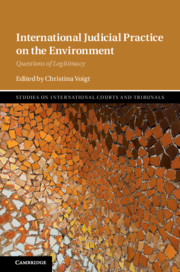Book contents
- Reviews
- International Judicial Practice on the Environment
- Studies on International Courts and Tribunals
- International Judicial Practice on the Environment
- Copyright page
- Contents
- Contributors
- Acknowledgements
- Table of Cases
- Introduction International Courts and the Environment: the Quest for Legitimacy
- Part I Procedural Legitimacy of Judicial Environmental Practice: Access to Justice
- Part II Legitimacy and Scientific Certainty: Environmental Adjudication, Use of Experts and the Limits of Science
- 4 Scientific Uncertainties: a Nightmare for Environmental Adjudicators
- 5 Ignorance, Uncertainty and Biodiversity: Decision-Making by the Court of Justice of the European Union
- Part III Judges as Law-Makers: Legitimate Development of Environmental Law
- Part IV Legitimacy of Outcomes: Performance, Effects (and Side-Effects)
- Part V The Legitimacy of Non-Compliance Procedures
- Part VI The Limits of Environmental Justice through Courts: Balancing Legitimacy with the Need for Creativity
- Index
4 - Scientific Uncertainties: a Nightmare for Environmental Adjudicators
from Part II - Legitimacy and Scientific Certainty: Environmental Adjudication, Use of Experts and the Limits of Science
Published online by Cambridge University Press: 15 April 2019
- Reviews
- International Judicial Practice on the Environment
- Studies on International Courts and Tribunals
- International Judicial Practice on the Environment
- Copyright page
- Contents
- Contributors
- Acknowledgements
- Table of Cases
- Introduction International Courts and the Environment: the Quest for Legitimacy
- Part I Procedural Legitimacy of Judicial Environmental Practice: Access to Justice
- Part II Legitimacy and Scientific Certainty: Environmental Adjudication, Use of Experts and the Limits of Science
- 4 Scientific Uncertainties: a Nightmare for Environmental Adjudicators
- 5 Ignorance, Uncertainty and Biodiversity: Decision-Making by the Court of Justice of the European Union
- Part III Judges as Law-Makers: Legitimate Development of Environmental Law
- Part IV Legitimacy of Outcomes: Performance, Effects (and Side-Effects)
- Part V The Legitimacy of Non-Compliance Procedures
- Part VI The Limits of Environmental Justice through Courts: Balancing Legitimacy with the Need for Creativity
- Index
Summary
- Type
- Chapter
- Information
- International Judicial Practice on the EnvironmentQuestions of Legitimacy, pp. 121 - 145Publisher: Cambridge University PressPrint publication year: 2019
- 3
- Cited by



